Sex Machine may refer to:
Sex Machine may refer to:
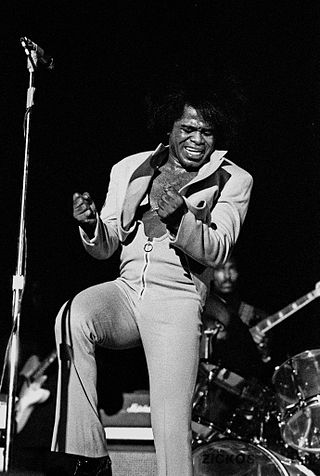
James Joseph Brown was an American singer, dancer, and musician. The central progenitor of funk music and a major figure of 20th-century music, he is referred to by various nicknames, among them "Mr. Dynamite", "the Hardest-Working Man in Show Business", "Minister of New Super Heavy Funk", "Godfather of Soul", "King of Soul", and "Soul Brother No. 1". In a career that lasted more than 50 years, he influenced the development of several music genres. Brown was one of the first ten inductees into the Rock and Roll Hall of Fame on January 23, 1986. His music has been heavily sampled by hip-hop musicians and other artists.
A people is a coherent social group or ethnic group.
Catch-22 is a 1961 post-modernist satirical novel by Joseph Heller.
Kingdom Come may refer to:
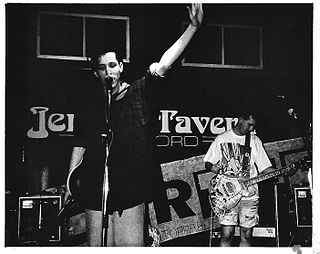
Carter the Unstoppable Sex Machine were an English indie rock band formed in 1987 by singer Jim "Jim Bob" Morrison and guitarist Les "Fruitbat" Carter. They made their name with a distinctive style of power pop, fusing samples, sequenced basses and drum machines with rock 'n' roll guitars and off-beat wordplay-loaded lyrics. They reached the height of their fame in 1992. Over the following years the band took on new members, reaching a six-piece, but struggled to regain their earlier popularity. They initially split up in 1998 after releasing seven albums.
Seventeen or 17 may refer to:
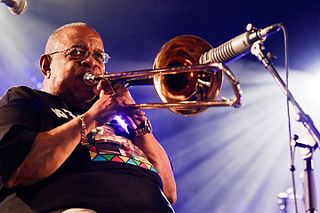
The J.B.'s was James Brown's band from 1970 through the early 1980s. On records, the band was sometimes billed under alternate names such as Fred Wesley and the JBs, The James Brown Soul Train, Maceo and the Macks, A.A.B.B., Fred Wesley and the New JBs, The First Family, and The Last Word. In addition to backing Brown, the J.B.'s played behind Bobby Byrd, Lyn Collins, and other singers associated with the James Brown Revue, and performed and recorded as a self-contained group. In 2015, they were nominated for induction into the Rock and Roll Hall of Fame but failed to be inducted and can be considered for Musical Excellence in the future. They have been eligible since 1995.

Sex Machine is a 1970 double album by James Brown. It showcases the playing of the original J.B.'s lineup featuring Bootsy and Catfish Collins, and includes an 11-minute rendition of the album's title song, different from the original recording of the title song which was released as a two-part single in 1970.
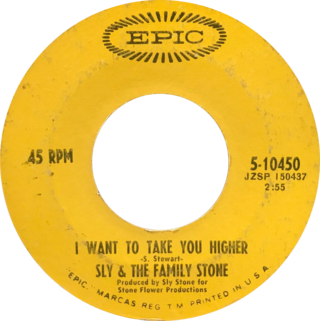
"I Want to Take You Higher" is a song by the soul/rock/funk band Sly and the Family Stone, the B-side to their top 30 hit "Stand!". Unlike most of the other tracks on the Stand! album, "I Want to Take You Higher" is not a message song; instead, it is simply dedicated to music and the feeling one gets from music. Like nearly all of Sly & the Family Stone's songs, Sylvester "Sly Stone" Stewart was credited as the sole songwriter.
Bobby Howard Byrd was an American rhythm and blues, soul and funk singer, songwriter, musician, record producer, bandleader, and talent dedicated. He played a part in the development of soul and funk music in association with James Brown.

"Papa's Got a Brand New Bag" is a song written and recorded by James Brown. Released as a two-part single in 1965, it was Brown's first song to reach the Billboard Hot 100 Top Ten, peaking at number eight, and was a number-one R&B hit, topping the charts for eight weeks. It won Brown his first Grammy Award, for Best Rhythm & Blues Recording.
A machine is a device that uses energy to perform some activity or task.
A liar is a person who tells lies.
Get Up may refer to:
"There Was a Time" is a song written and performed by James Brown.
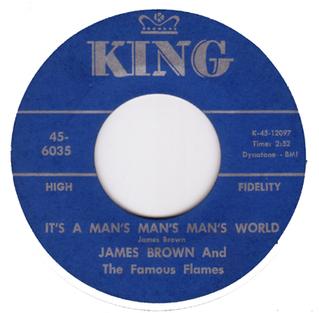
"It's a Man's Man's Man's World" is a song written by James Brown and Betty Jean Newsome. Brown recorded it on February 16, 1966, in a New York City studio and released it as a single later that year. It reached No. 1 on the Billboard R&B chart and No. 8 on the Billboard Hot 100. Its title is a word play on the 1963 comedy film It's a Mad, Mad, Mad, Mad World.
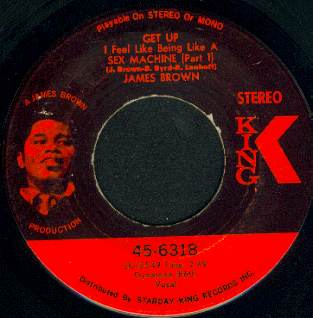
"Get Up Sex Machine" is a funk song recorded by James Brown with Bobby Byrd on backing vocals. Released as a two-part single in 1970, it was a no. 2 R&B hit and reached no. 15 on the Billboard Hot 100.
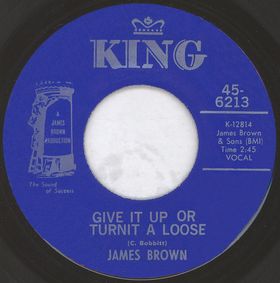
"Give It Up or Turnit a Loose" is a funk song recorded by James Brown. Released as a single in 1969, the song was a #1 R&B hit and also made the top 20 pop singles chart. "Give It Up or Turnit a Loose" appeared as an instrumental on the Ain't It Funky (1970) album, removing Brown's vocals and adding guitar overdubs, while the vocal version was released on It's a New Day – Let a Man Come In (1970).
"Brother Rapp" is a 1970 funk song written and performed by James Brown. It was first released as a two-part single on King Records (K6285) in early 1970, but was quickly withdrawn from sale. It was released again later that year in a mechanically sped-up version that charted #2 R&B and #32 Pop. It also appeared on the album Sex Machine with overdubbed crowd noise, and Brown later issued it in a faded version with different guitar work, in 1973 for the Slaughter's Big Rip-Off soundtrack album. A live version of "Brother Rapp" is included on the album Love Power Peace.
Get On Up may refer to: